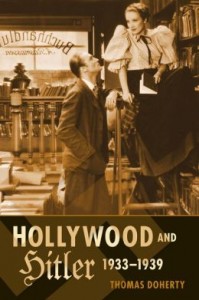Hollywood and Hitler, 1933-1939 by Thomas Doherty (New York: Columbia University Press, 2013), 429 pages ISBN: 978-0-231-16392-7 (hardback),
 About the reviewer: Professor Jo Fox is a specialist in the history of propaganda in twentieth-century Europe. She has published on the cinematic cultures of Britain and Germany during the Second World War, exploring the connections between film, propaganda and popular opinion. She is currently working on two main projects: on rumour and oral propaganda in the First and Second World Wars and on the 'afterlife' of wartime propaganda narratives from 1945. In 2007, she was appointed a National Teaching Fellow. She is also a member of the Council for the International Association of Media and History and is on the editorial board of their academic journal, The Historical Journal of Film, Radio and Television. She is the honorary director of communications for the Royal Historical Society. Her publications include: Filming Women in the Third Reich (2000) and Film Propaganda in Britain and Nazi Germany: World War II (2007). She also co-edited, with David Welch, Justifying War - Propaganda, Politics and the Modern Age (2012).
About the reviewer: Professor Jo Fox is a specialist in the history of propaganda in twentieth-century Europe. She has published on the cinematic cultures of Britain and Germany during the Second World War, exploring the connections between film, propaganda and popular opinion. She is currently working on two main projects: on rumour and oral propaganda in the First and Second World Wars and on the 'afterlife' of wartime propaganda narratives from 1945. In 2007, she was appointed a National Teaching Fellow. She is also a member of the Council for the International Association of Media and History and is on the editorial board of their academic journal, The Historical Journal of Film, Radio and Television. She is the honorary director of communications for the Royal Historical Society. Her publications include: Filming Women in the Third Reich (2000) and Film Propaganda in Britain and Nazi Germany: World War II (2007). She also co-edited, with David Welch, Justifying War - Propaganda, Politics and the Modern Age (2012).
It appears to be time to re-evaluate Hollywood’s relationship with the Third Reich. 2013 saw the publication of two new monographs on the subject: Thomas Doherty’s Hollywood and Hitler, 1933-1939 and Ben Urwand’s The Collaboration: Hollywood’s Pact with Hitler (Belknap Press). Whereas Urwand makes bold accusations of deliberate collusion, Doherty provides a more nuanced account of the ways in which the American film industry worked alongside, interpreted and sometimes challenged the National Socialist regime. Doherty confronts the popular image of 1930s Hollywood – of Ginger Rogers and Fred Astaire dancing the American Smooth, of Scarlet O’Hara’s spirited defence of her beloved Tara, and of Dorothy’s magical journey down the Yellow Brick Road – and points to a darker side that ‘is more apt to tarnish than polish the luster of the Golden Age mythos’ (page 12). The book, based primarily on a close reading of the Hollywood trade press and covering newsreels, shorts and feature films, begins with the controversy over the 1930 film adaption of Eric Maria Remarque’s All Quiet on the Western Front. The German ban on the film signalled the economic, political and moral dilemmas that the studios, filmmakers, distributors and artists would face in the coming years.
 Moving chronologically, Doherty captures the unfolding relationship between America’s film community and the new regime. He makes a determined attempt not to ‘read forward’, but rather to tell the story through the trade press, serving as contemporary observers to an opaque and evolving set of circumstances. Doherty freely admits that he deliberately avoided the ‘mammoth bulk of the secondary scholarship written on the 1930s and on Nazism’ (p. 375). As a result, Hollywood and Hitler falls short of a more wide-ranging, contextualised and historiographically-informed analysis. Nonetheless, a series of individual stories, set within the broader commentary of the trade press, remind the reader of the personal implications of Nazi rule for the film community. Doherty cuts in and out of vignettes documenting the experience of the studios’ representatives in Berlin, increasingly subject to NS laws and repression, of Europe’s film émigrés who reinvented ‘Weimar on the Pacific’, of Isobel Steel (the inspiration for one of the few early productions to confront Nazi terror, I was a captive of Nazi Germany, 1936), of Cornelius Vanderbilt Jr.’s curious newsreel encounter with Adolf Hitler, and of Texas congressman Martin Dies Jr.’s establishment of the House Committee on Un-American Activities (HUAC) to flush out ‘un-American propaganda’ of any variety. Dies had a particular eye on Hollywood. His investigations ended in ridicule when Shirley Temple was accused of being a ’Comintern mouthpiece’ by virtue of appearing in the French newspaper Ce Soir: clearly no-one was safe, mocked Variety, suggesting that Mickey Mouse and Snow White had been ‘signed up for… communist front organization[s]’ (p.232-3).
Moving chronologically, Doherty captures the unfolding relationship between America’s film community and the new regime. He makes a determined attempt not to ‘read forward’, but rather to tell the story through the trade press, serving as contemporary observers to an opaque and evolving set of circumstances. Doherty freely admits that he deliberately avoided the ‘mammoth bulk of the secondary scholarship written on the 1930s and on Nazism’ (p. 375). As a result, Hollywood and Hitler falls short of a more wide-ranging, contextualised and historiographically-informed analysis. Nonetheless, a series of individual stories, set within the broader commentary of the trade press, remind the reader of the personal implications of Nazi rule for the film community. Doherty cuts in and out of vignettes documenting the experience of the studios’ representatives in Berlin, increasingly subject to NS laws and repression, of Europe’s film émigrés who reinvented ‘Weimar on the Pacific’, of Isobel Steel (the inspiration for one of the few early productions to confront Nazi terror, I was a captive of Nazi Germany, 1936), of Cornelius Vanderbilt Jr.’s curious newsreel encounter with Adolf Hitler, and of Texas congressman Martin Dies Jr.’s establishment of the House Committee on Un-American Activities (HUAC) to flush out ‘un-American propaganda’ of any variety. Dies had a particular eye on Hollywood. His investigations ended in ridicule when Shirley Temple was accused of being a ’Comintern mouthpiece’ by virtue of appearing in the French newspaper Ce Soir: clearly no-one was safe, mocked Variety, suggesting that Mickey Mouse and Snow White had been ‘signed up for… communist front organization[s]’ (p.232-3).
The studios and the US censors, particularly Joseph Breen’s office, do not emerge from Doherty’s account in a positive light. Doherty condemns the censors’ cowardly avoidance of any subject that might cause offence to the emergent dictatorship and the studios’ prioritisation of profit over principles. Nonetheless, he explains the studios’ misplaced belief that they could simply await the collapse of the Reich while maintaining a foothold in the central European market and that film censors’ diplomatic sensitivities were not confined to the United States. Breen’s view that ‘the purpose of the screen, primarily, is to entertain and not to propagandize’ was far from unique (p. 58).
Not all studios avoided the subject, however. Warner Brothers did not shy away from attacking the European dictators. Their programme culminated in Anatole Litvak’s Confessions of a Nazi Spy and William Dieterle’s Juarez, both released in 1939. Such productions prompted Groucho Marx to proclaim Warners to be the ‘only studio with any guts’ (p. 310). Equally, the Hollywood Anti-Nazi League, founded by screenwriters Donald Ogden Stewart and the formidable Dorothy Parker, conducted a sustained pressure campaign throughout the 1930s amid countless political accusations and threats from the Nazi consul in Los Angeles, Georg Gyssling. They worked tirelessly to keep Vittorio Mussolini and Leni Riefenstahl from receiving any kind of audience in Hollywood.
... Doherty condemns the censors’ cowardly avoidance of any subject that might cause offence to the emergent dictatorship
Thomas Doherty’s book is a good introduction to the complex relationship between Hollywood and the Third Reich. The source-base could have been extended to include materials to show the official German or indeed the American popular response to some of the episodes described here, and it would have benefitted from a deeper contextual knowledge of the political and international environment in which these debates took place and the films circulated. Nonetheless, it is an excellent and fascinating read, but it will not be the last word on this controversial and enduring subject.
Professor Jo Fox